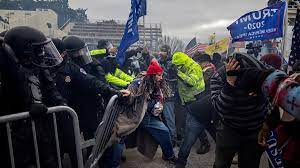Hoover, J., Atari, M., et al.
Nat Commun 12, 4585 (2021).
https://doi.org/10.1038/s41467-021-24786-2
Abstract
Understanding motivations underlying acts of hatred are essential for developing strategies to prevent such extreme behavioral expressions of prejudice (EBEPs) against marginalized groups. In this work, we investigate the motivations underlying EBEPs as a function of moral values. Specifically, we propose EBEPs may often be best understood as morally motivated behaviors grounded in people’s moral values and perceptions of moral violations. As evidence, we report five studies that integrate spatial modeling and experimental methods to investigate the relationship between moral values and EBEPs. Our results, from these U.S. based studies, suggest that moral values oriented around group preservation are predictive of the county-level prevalence of hate groups and associated with the belief that extreme behavioral expressions of prejudice against marginalized groups are justified. Additional analyses suggest that the association between group-based moral values and EBEPs against outgroups can be partly explained by the belief that these groups have done something morally wrong.
From the Discussion
Notably, Study 5 provided tentative evidence that binding values may be a particularly important risk factor for the perceived justification of EBEPs. Participants who were experimentally manipulated to believe an outgroup had done something immoral were more likely to perceive acts of hate against that outgroup as justified when they felt that the outgroup’s behavior was more morally wrong. However, this association between PMW and the justification of hate acts was strongly moderated by people’s binding values, but not by their individualizing values. Ultimately, comparing people high on binding values to people high on individualizing values, we found that the average causal mediation effect in the domain of binding values was more than six times the average causal mediation effect in the domain of individualizing values. In other words, our results suggest that if two people see an outgroup’s binding values violation as equally morally wrong, but one of them has higher binding values, the person with higher binding values will see EBEPs against the outgroup as more justified. However, no such difference was observed in the domain of individualizing values.
Accordingly, our results suggest that people who attribute moral violations to an outgroup may be at higher risk for justifying, or perhaps even expressing, extreme prejudice toward outgroups; however, our results also suggest that people who prioritize the binding values may be particularly susceptible to this dynamic when they perceive a violation of ingroup loyalty, respect for authority, and physical or spiritual purity. In this sense, our findings are consistent with the hypothesis that acts of hate—a class of behaviors of which many have received their own special legal designation as particularly heinous crimes4—are partly motivated by individuals’ moral beliefs. This view is well-grounded in current understandings of the relationship between morality and acts of extremism or violence.


